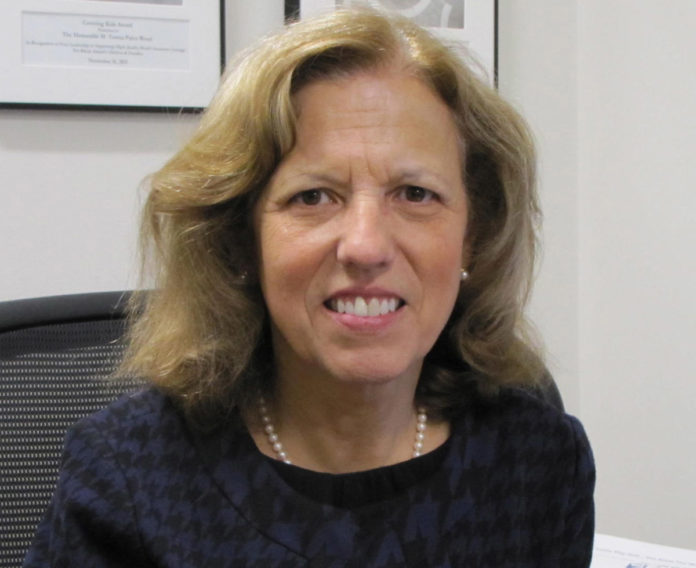
M. Teresa Paiva Weed joined the Hospital Association of Rhode Island in April 2017. As HARI president, she oversees day-to-day operations of the association and direct-member services. Previously, she served the Rhode Island Senate for 25 years, and was Senate president from 2009 to 2017. Paiva Weed holds a law degree from Catholic University Columbus School of Law and a bachelor’s degree from Providence College.
Paiva Weed spoke recently with Providence Business News about her decision to leave elected office to lead HARI, after former HARI president Michael Souza left to take another position in Rhode Island’s health care sector, and the future of health care in Rhode Island.
PBN: How will your lengthy experience as a state legislator and a member of the General Assembly’s leadership inform your work at HARI?
PAIVA WEED: As a state senator, I spent more than two decades working to improve the lives of Rhode Islanders. I believe affordable, efficient health care is essential to quality of life. Hospitals serve an important role in our state’s economy and are key to a strong Rhode Island.
During my time as a legislator, I was honored to play a role in the development and support of RIte Care. I’ve also been concerned with several important public health issues, including mental health, substance abuse and lead poisoning. I look forward to continuing this passion in my new role at HARI.
PBN: What are your primary goals and objectives for the next 12 months at HARI?
PAIVA WEED: We are in an era of uncertainty. The health care landscape is changing quickly and our members are having to adapt to new delivery and payment models while continuing to provide access and care for their patients. HARI is working with its members to help them better navigate these changing times as the industry evolves.
I also hope to elevate the visibility of HARI in the community and the critical role it plays in health care policy development.
PBN: With some local hospitals struggling with significant financial losses and the uncertainty in Washington with the efforts to repeal and replace the Affordable Care Act, what role does HARI play in helping member hospitals prepare for an uncertain future?
PAIVA WEED: HARI and its members are disappointed that officials in Washington are working to undo improvements that have benefited patients across our state. Passage of the American Health Care Act threatens access to health care for 100,000 Rhode Islanders. These individuals, and others, have benefited tremendously from the Affordable Care Act, which expanded health coverage through Medicaid expansion and Rhode Island’s Health Exchange.
Proposed changes to the Medicaid program will limit services to our most vulnerable patients and further reduce provider payments that already fail to cover the cost of care. Most alarming is that the legislation passed by the U.S. House of Representatives repeals much of the funding currently dedicated to providing coverage in the future, yet reductions to payments for hospital services remain. If coverage is not maintained at the current level, those resources need to be returned to hospitals and health systems to provide services to what will likely be an increased number of uninsured patients.
We greatly appreciate the support of our congressional delegation and other state leaders in opposing any measures that reduce health care coverage for Rhode Islanders. We must protect patients and find ways to maintain coverage for as many Americans as possible. Changes to the Affordable Care Act must be guided by the principles of making continued coverage a priority.
PBN: Care New England will be purchased by Partners Health Care in Boston, Memorial Hospital is up for sale to Prime Health Care Foundation and South County Hospital is in discussions with Yale New Haven Health. While we don’t know what these initiatives’ final outcomes will be, what are the pros and cons for the Rhode Island economy and for consumers of health care entities being owned by out-of-state conglomerates?
PAIVA WEED: This is a trend that we’re seeing across the country. The benefit of these initiatives is future financial stability for these state assets.
Hospitals not only stand ready to care for all patients who enter their doors, but are also among the largest employers in our state. HARI recently released a report that detailed more than $7 billion in economic impact is provided by hospitals each year. This is an important role that must be protected.
Hospitals understand what is at stake and are making difficult decisions. However, they make these choices with patients, employees and the community top of mind.
PBN: Lifespan, which is not a HARI member, experienced a $32.6 million operating loss in its fiscal year 2015, after earning operating income in the prior year; CNE, a HARI member, had operating losses of nearly $28 million in fiscal 2015, which grew to approximately $68 million in fiscal 2016. What do you see as the primary reasons for such losses?
PAIVA WEED: During my first few weeks, I have been visiting our member hospitals to learn more about their services and role in the community. I have been struck by the significant investments our hospitals are making to ensure they can appropriately meet the health care needs of Rhode Islanders. These investments are necessary to improve infrastructure, implement technology and attract top experts.
However, all hospitals must have a financial margin at the end of each year to have the resources necessary to make these important investments. Government payers reimburse hospitals at less than the cost of providing care and there are restrictions on the rates paid by private insurers, which leaves hospitals in the red each year. This is alarming. It’s not only bad for hospitals – it’s bad for patients and bad for Rhode Island.
Nancy Kirsch is a PBN contributing writer.












